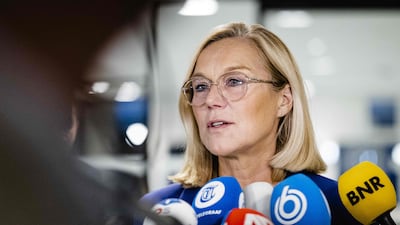Dutch Foreign Minister Sigrid Kaag, who led the UN’s mission to eliminate chemical weapons from Syria, has resigned over the government’s handling of the crisis in Afghanistan.
Ms Kaag on Thursday became the first western politician to step down over the upheaval that ensued following the Taliban’s return to power.
In a parliamentary debate on Wednesday night, Ms Kaag acknowledged that the government’s slow and muddled response to warnings about the situation in Afghanistan meant some local staff and people who had worked as translators for Dutch troops in the country had not been flown out.
After the motion was passed on Thursday, Ms Kaag, 59, immediately said she would tender her resignation, saying that parliament had decided “that the Cabinet has acted irresponsibly".
“I can only accept the consequences of this judgment as the minister with ultimate responsibility,” she said.
Ms Kaag is still the leader of the liberal D66 party, which she steered to second place in elections in March.
Speaking yesterday, she told MPs that foreign affairs was her passion and called her role as foreign minister a vocation.
From 2013 to 2014 Ms Kaag served as undersecretary general and special coordinator of the United Nations Organisation for the Prohibition of Chemical Weapons' joint mission to eliminate Syria’s chemical weapons.
She was responsible for leading a team of 100 experts responsible for destroying the weapons stockpile before a deadline in June 2014.
She co-ordinated the operation from Damascus while remaining at the core of talks between the US and Russia.
In September 2014, she spoke about “the speed and pressure under which this operation had to happen” and praised experts for their efforts.
She said she hoped that once the chemical weapons had been removed, “the conditions for peace and security and the political process will be centre stage for the benefit of the people of Syria”.
Her diplomatic career began as the deputy head of the UN political affairs department within the Dutch Ministry of Foreign Affairs in 1990.
Three years later, she was dismissed from the post after it emerged she had secretly married the deputy PLO minister Anis Al Qaq in Jerusalem.
As a fluent Arabic speaker who is married to a Palestinian, Ms Kaag is seen as someone with a good grasp of Arab culture.
She began another stint at the UN in 1994 which lasted until 2017, working in several leading roles within agencies in the Middle East.
Her titles included senior programme manager for the external relations office of UNRWA in Jerusalem in 1994, regional director for Mena for Unicef in Amman in 2007 and the special co-ordinator for Lebanon in 2014.
On Friday Dutch Defence Minister Ank Bijleveld was the second member of government to be pushed out the door over the handling of the situation in Afghanistan.
She said she could no longer continue in the role with the debate that had arisen around her position.
"I informed my party and prime minister that I will ask the king to receive my resignation," Ms Bijleveld said, referring to Dutch Prime Minister Mark Rutte.
"I don't want to get in the way of the important work" of colleagues who are still trying to get people out of Afghanistan, she said.
Ms Bijleveld, 59, was condemned on the grounds that the evacuation of civilians from Afghanistan was delayed and unsuccessful in many cases.
She is a member of the Christian Democratic Party and had served as defence secretary since 2017.
Before the vote, Ms Bijleveld said she did not intend to step down regardless of the result.
Don Ceder, a member of the Christian Union, said on Thursday that his party supported the motion against Ms Kaag and a similar one against Ms Bijleveld – a move that secured majority backing for the censures.
Mr Ceder said the government “failed to show decisiveness, to show compassion, to pick up on signals and ultimately to take responsibility for people for whom we bear responsibility".
Ms Kaag was a minister in a caretaker Dutch government that is in power amid drawn-out negotiations to form a new ruling coalition after a general election in March.
The outgoing minister, who leads the centrist D66 party, has been closely involved in those talks along with caretaker prime minister Mr Rutte, whose conservative People’s Party for Freedom and Democracy won the most seats in the election.
It was not immediately clear what effect Ms Kaag's resignation would have on those negotiations. Dutch broadcaster NOS reported that Ms Kaag said she would continue in the coalition talks.
In her resignation speech, she said D66 ministers would remain in the caretaker government.
Ms Kaag’s resignation came a day after British Prime Minister Boris Johnson demoted Foreign Secretary Dominic Raab as part of a Cabinet shake-up.
Mr Raab faced criticism for being on holiday in Crete as the Taliban took over Afghanistan last month. He was seen relaxing on a beach on the Greek island as members of the militant group entered Kabul, although he said he was in touch with officials and ministerial colleagues.


